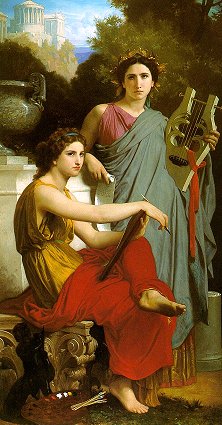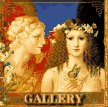|
MYTH MAN'S HOMEWORK HELP
The Muses of Greek mythology had one of the most important functions of all: to inspire poets and promote the arts and sciences. The fortunate person inspired by them was held in the highest esteem and considered sacred far beyond any priest. The Muses were often described as the queens of song, and no Olympian banquet was complete without them. According to the earliest writers the Muses were the inspiring goddesses of songs, and they eventually were portrayed as divinities presiding over the different kinds of poetry and over the arts and sciences. As patrons of the fine arts, the Muses promoted the more civilized aspects of human existence. The ancient writer Hesiod said of them, "They are all of one mind, their hearts are set upon song and their spirit is free from care. He is happy whom the Muses love. For though a man has sorrow and grief in his soul, yet when the servant of the Muses sings, at once he forgets his dark thoughts and remembers not his troubles. Such is the holy gift of the Muses to men." That was the reason that the Muses were frequently invoked over thousands of years of artistic expression and remain yet today reference points for artists, poets, writers and musicians. They were said to be the daughters of Zeus, king of the Olympian gods, and Mnemosyne, the goddess of Memory, even though others claim that their parents were actually Uranus (Sky) and Gaea (Mother Earth). They were born in Pieria, at the foot of Mount Olympus. After the Titans had been defeated and Zeus had consolidated his rule and established himself as the supreme Olympian, he lay with the Titaness Mnemosyne for nine nights because he needed to create someone to sing of his glory. The result was the Muses. Seated on lofty Mount Olympus near the throne of Zeus, they sang of his greatness, about the marvelous deeds of the splendid Greek heroes and of the origin of the stars, the earth, and all its wonderful creatures. They also delighted in parties and feasts and took great pleasure in song and dance. But they weren't just beautiful party animals...It was the Muses who discovered letters and thus created poetry and writing. They were brilliant. (It was the Song of the Muse which inspired the Myth Man to create this web site for you.) The Muses took joy in communication and gave birth to dialogue, in essence helping to create that which they sang about. By praising the gods, they completed their glory. By boasting of the glorious deeds of valiant warriors they forever etched those names in history - If the Muse didn't sing about you, you were forgotten...it was almost as if you had never existed. The god dearest to them was Apollo and they were his faithful followers. For that reason he is often called the Musegetes, which means "Leader of the Muses". A few others claim that Hypnos, the god of Sleep, was their favorite. Beside them on Mount Olympus were seated the three Charites (Graces), who were the attendants of Aphrodite and personified charm and beauty, and next to the Graces sat Himerus (Desire). After Pegasus the flying horse was born the young colt was taken in by the goddess Athena and carried to Mount Helicon where she entrusted the Muses with his care. In his excitement at meeting the sisters, young Pegasus struck the the side of the mountain with his hooves and caused the springs of Aganippe and Hippocrene to gush forth their bounty of inspiration. These springs were sacred to the Muses as were all springs and wells. Urania, the Muse of Astronomy and Universal Love (also an aspect of Aphrodite) showed the most interest in the rearing of Pegasus. Prophesying of his future heroic deeds and eventual celestial honor she grieved the most when Bellerophon, at Athena's beckoning, came to take Pegasus away from Mount Helicon. Urania rejoiced when Pegasus rejoined the Muses on Mount Olympus following the death of Bellerophon. The Muses are sometimes called the Pierides, but others think that these were nine sisters, daughters of a man called Pierus, who dared challenge the Muses in a contest of song and, having been defeated, were turned into magpies, greenfinches, goldfinches, ducks and other birds. The Pierides were not the only ones punished by the Muses for competing against them. A minstrel named Thamyris engaged in a musical contest with the Muses in a city called Dorium, but of course he lost and they took his eyes and minstrelsy. But others say that, for his foolish boast against the Muses, he was first punished in Hades. Demodocus was another man whom they deprived of his eyes, but at least he received the gift of song from them. Even though the Sirens were supposed to be daughters of the Muse of dance Terpsichore and the river god Achelous, still they were prompted by Hera to compete in song with the Muses and naturally couldn't match them. As punishment the Muses plucked their feathers and made crowns out of them for themselves. Another one of their victims was King Pyreneus of Daulis. He attempted to forcibly seduce the Muses but perished when he leapt from the pinnacle of a tower trying to follow them - The Muses could fly...the king couldn't... The Muses taught Aristaeus the arts of prophecy and healing, and instructed the nymph Echo to play beautiful music. Their disciples also included the Sphinx, who learned her riddle from them, and Musaeus, whom some call a son of the great poet Orpheus, was trained by the Muses. The Muses sing usually for the gods, but they are said to have sung in other special occasions such as the funeral of Achilles, the fallen hero of the Trojan War, and the weddings of Peleus, and of Cadmus & Harmonia. But it was rare indeed for the Muses to sing other than for the gods. The sacrifices offered to the Muses, in return for divine inspiration, consisted of libations of water or milk, and of honey. The number of Muses varies over time. At first only one Muse was spoken of but later poets mention three: Melete (Practice, Study), Mneme (Memory), and Aoede (Song). They were nymphs in Pieria, which is found in western Thrace, and their cult was brought to Mount Helicon in Boeotia by the Aloads. (Mount Helicon was one of the Muses' sacred mountains, the others being Pierus in Pieria, where they were born, Mount Parnassus with its Castalian spring and, naturally, Mount Olympus. The worship of the Muses was introduced from Thrace and Pieria into Boeotia, particularly the aforementioned Mount Helicon and its sacred fountains of Aganippe and Hippocrene.) Eventually it became accepted that there were nine muses: Calliope, Clio, Erato, Euterpe, Melpomene, Polyhymnia, Terpsichore, Thalia, and Urania. Each had her own domain: Calliope is the eldest and most distinguished of the nine Muses and initially identified with philosophy. She is the Muse of eloquence and epic or heroic poetry. Calliope, which means "beautiful voice", is the mother of the great poets and musicians Orpheus and Linus with Apollo. When Persephone, goddess of the Underworld, argued with the goddess of love Aphrodite over the affections of handsome Adonis, Zeus sent wise Calliope to be the judge and arbitress. She decided that Adonis should spent part of the year with Persephone and the rest with Aphrodite. Her emblems are a stylus and wax tablets, and sometimes with a roll of paper or a book. Clio is the Muse of historical and heroic poetry. With Pierus, the king of Macedonia, she is the mother of Hyacinth, who was accidentally killed by his beloved Apollo while practicing throwing the discus one day. She was credited for introducing the Phoenician alphabet into Greece. Her attribute is usually a parchment scroll or a set of tablets. She is often also represented in a sitting or standing attitude, with an open roll of paper, or chest of books. Her name means "Proclaimer" and she is so named because her songs and those of the poets bestow everlasting glory upon those praised by her. Erato is the Muse of lyric poetry, particularly love and erotic poetry, and mimicry. Her name means "Lovely" and she is usually depicted with a lyre. She is so named because she turns those who follow her into men who are desired and worthy to be loved. She is particularly fond of the poets of love. Euterpe's name means "Delight" and indeed she brings delight and joy to all those who hear her sing. She was the Muse of lyric poetry and music, particularly the flute, which she invented. The double-flute is her attribute. Melpomene is the Muse of tragedy. She is usually represented with a tragic mask, the club of Hercules or a sword, and wearing the cothurnus, which are the boots traditionally worn by tragic actors. Sometimes she holds a knife or club in one hand, a mask in the other, and her head is surrounded with vine leaves. Her name loosely translates to "choir" and she is named because of her chanting which charms and inspires her listeners. Polyhymnia is the Greek Muse of the sublime and sacred hymn, eloquence and dance. She is usually represented in a pensive or meditating position and appears without any attribute. She is a serious looking woman, dressed in a long cloak and resting with an elbow on a pillar. Sometimes she holds a finger to her mouth. Her name means "many songs" and is sometimes spelled Polymnia. She is so named because by her great praises she brings honor and distinction to writers and poets whose works have won for them immortal fame. Terpsichore is the Muse of dancing and the dramatic chorus, and later of lyric poetry. Hence the word terpsichorean, pertaining to dance. She is usually represented seated and holding a lyre or a plectrum. According to some traditions, she is the mother of the Sirens with the river-god Achelous. She is also occasionally mentioned as the mother of Linus by Apollo. Terpsichore delights her disciples with the good things to be attained from education, choral dance and song. Those who have honored her in dances are dearest to her. Thalia presided over comedy and pastoral, merry and idyllic poetry. She also favored rural pursuits and is represented holding a comic mask and a shepherd's staff, or a wreath of ivy, which are the attributes she is most often associated with. She is worshipped because the fame of those whose praises she sings flourishes and lasts for long periods of time. Please note that Thalia is also the name of one of the three Graces (Charites). Urania is the Greek Muse of astronomy, astrology and Universal love. Along with her sister Muse Terpsichore she is occasionally mentioned as the mother of Linus by Apollo. She is represented with a globe in her left hand and a peg in her right hand. Urania is dressed in a cloak embroidered with stars and she keeps her eyes towards the sky. Her name means "Heavenly" and Urania is so named because she raises her disciples to heavenly heights. Among her other talents she could foretell the future by the position of the stars. Those who are most concerned with philosophy and the heavens are dearest to her.
|

